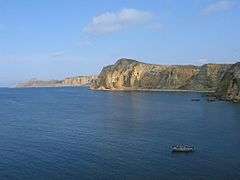Benguela
| Benguela | ||
|---|---|---|
| Municipality and town | ||
|
Igreja Benguela | ||
| ||
 Benguela Location in Angola | ||
| Coordinates: 12°33′S 13°25′E / 12.550°S 13.417°ECoordinates: 12°33′S 13°25′E / 12.550°S 13.417°E | ||
| Country |
| |
| Admin. division | Benguela Province | |
| Founded | 1617 | |
| Area | ||
| • Total | 2,100 km2 (800 sq mi) | |
| Elevation | 39 m (128 ft) | |
| Population (2008) | ||
| • Total | 128,084 | |
| • Density | 61/km2 (160/sq mi) | |
| Climate | BWh | |
Benguela (Portuguese pronunciation: [bẽˈɡɛlɐ], São Felipe de Benguela, formerly spelled Benguella) is a city in western Angola, south of Luanda, and capital of Benguela Province.[1] It lies on a bay of the same name, in 12° 33’ S., 13° 25’ E. Benguela is one of Angola's most populous cities.
History
Portuguese rule
Benguela was founded in 1617 by the Portuguese under Manuel Cerveira Pereira, 8th Governor of Angola (1604–1607).[1] It was long the centre of an important trade, especially in slaves to Brazil and Cuba. Ships anchored about 1.6 kilometres (1 mi) off the shore, in depths of 7 to 11 metres (23 to 36 ft) and transferred loads to smaller boats which used five or six jetties in the town. However the nearby deep-water sheltered harbour of Lobito was a much larger port.
.svg.png)
Besides the churches of S. Felipe and S. António, the hospital, and the fortress, there were, as of 1911, only a few stone-built houses.[2] A short way beyond Benguela is Baía Farta, where salt was manufactured and sulphur was extracted. Close to Baia Farta was the beach of Baia Azul. The city prospered and grew in the following decades. The Benguela Railway was built in the early 20th century by Portugal to connect the city and Lobito to the interior, and it achieved great success when linked to the Copperbelt of Katanga, DR Congo and Zambia. Starting in the early 20th century, Benguela attracted, developed, and retained quality businesses and professionals into its thriving and growing economy. Sisal and fishing industries expanded and the financial, construction and services market boomed until 1974.[3]
After independence from Portugal
In 1975, after the April 1974 Carnation Revolution in Lisbon, Portugal, the Portuguese Overseas Province of Angola became independent. Due to the civil war in Angola (1975–2002), which lasted more than 20 years after independence from Portugal, the important Benguela railway line closed, with only the short distance of 30 kilometres (19 mi) between Benguela and Lobito remaining operational. In the mid-2000s, with a more peaceful environment, restoration of the railway between Benguela and Huambo commenced.
In 1983 Benguela had a population of 155,000. During the civil war the city of Benguela increased its population due to refugees from the countryside. While the colonial part of the city consists of relatively good-quality houses, as of 2011 most of the refugees live in slum areas.
Economy
Benguela was one of the centres of Portuguese trade to the African interior. The city remains an important commercial link between western and eastern Angola. Coffee, corn, sisal, sugarcane, and tobacco are grown in the interior regions of Angola and widely traded in Benguela. Manganese from the interior is also traded in Benguela. Industries local to the city include fish processing and the milling of sugarcane; the city also produces pottery, soap, and tools.[1]
Foreign trade is handled through the deep-water port of Lobito, which is located 29 kilometres (18 mi) north of Benguela. Lobito, once the busiest port in Angola, was severely disrupted during the Angolan Civil War. The port has since revived and supports trade in the Benguela region.[1][1]
Education
The city formerly had a German school, Deutsche Schule Benguela.[4]
Notable residents
- Leila Lopes - actress and Miss Universe 2011
Transportation

- Benguela Airport
- Benguela Railway
- Port of Lobito
References
| Wikimedia Commons has media related to Benguela. |
- 1 2 3 4 5 "Benguela". Encyclopædia Britannica (Encyclopædia Britannica Online Academic ed.). Chicago, Ill.: Britannica Online. 2013. OCLC 33663660.
- ↑
 One or more of the preceding sentences incorporates text from a publication now in the public domain: Chisholm, Hugh, ed. (1911). "Benguella". Encyclopædia Britannica. 3 (11th ed.). Cambridge University Press. p. 737.
One or more of the preceding sentences incorporates text from a publication now in the public domain: Chisholm, Hugh, ed. (1911). "Benguella". Encyclopædia Britannica. 3 (11th ed.). Cambridge University Press. p. 737. - ↑ BenguelaAnosOuro.wmv, a film of Benguela, Overseas Province of Angola before 1975.
- ↑ "Deutscher Bundestag 4. Wahlperiode Drucksache IV/3672" (Archive). Bundestag (West Germany). 23 June 1965. Retrieved on 12 March 2016. p. 30/51.

